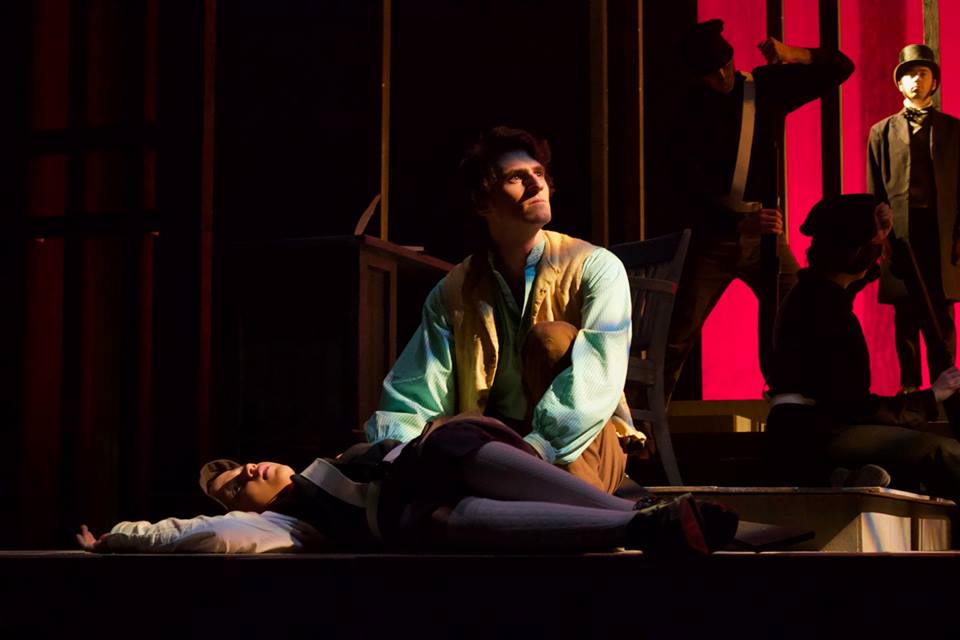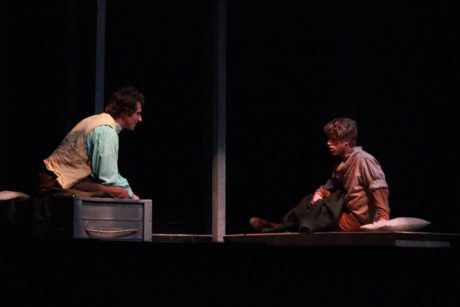Despite period costumes, The Night Thoreau Spent in Jail feels current, primarily because it is so topical. Jerome Lawrence and Robert E. Lee wrote the play in 1969, but George Mason’s production, directed by Ed Gero, feels as if it were written for today’s audience. Shifting back and forth from a night spent in jail to life events that led up to it, we see Thoreau’s growth as a teacher, naturalist, philosopher, and individualist. The script is provocative, acting is solid, characters are sympathetic, and the set is evocative.

It helps to have a little context for this historical figure. In protest against the Mexican-American War and the Fugitive Slave Law, Henry David Thoreau promoted civil disobedience. By forcing a friend to jail him for refusing to pay a poll tax that was to be used for war, Thoreau instituted one of this country’s first examples of peaceful political protest. His action, and the book he wrote about it, were inspirational for generations of non-violent protesters who followed, such as Gandhi and Martin Luther King, Jr. When the playwrights wrote it, they were seeing resonance with Vietnam-era protests and we see it again today with #TimesUp, #BlackLivesMatter, and #Resist movements. The 50th anniversary of King’s death is next week, and with that and this play in mind, it seems time to reconsider how we, as individuals, choose to respond to governmental or societal problems. The play is a gentle, but heartfelt, call to action.
Henry David Thoreau was a man who didn’t follow the designated path for a graduate of Harvard in 1846. He questioned the rules and choices of his mother, his employers where he taught, the government, and even his own friend and mentor, the famed lecturer on Transcendentalism, Ralph Waldo Emerson. Transcendentalism is the belief of the divinity of nature and individualism, seen as better than societal institutions such as organized religion. Despite being “behind bars,” Thoreau insists he is a free man. He has strong beliefs and even more than his idol, Emerson, he chooses to embody the core values of those beliefs, by standing up against what he feels is wrong.
Thoreau is played likably by Noah Peterson. His character reminds one of an enlightened genius cousin who was steps ahead of everyone but kindly tries to help you understand. Ryan Phillips plays Emerson, who is also brilliant and generous, as well as committed to big social philosophies. His acting blends the traits of intellect and humility believably. Jared Sever plays a warm-hearted John Thoreau, whose affectionate influence on his brother Henry lasts far beyond his time onstage. Miranda Newman plays a winsome Ellen, who is admired by John, but has eyes for Henry. Jacob Horowitz is a friendly, if slightly dense sheriff, who would rather not have to arrest Henry. The rest of the ensemble is also strong and supports the play’s messages well.

The set design is by the brilliantly talented Luciana Stecconi. The set floor is layered platforms of wood planking, with a forestage jutting out towards the audience. The same aged gray wood is used for the sparse furnishings, which included a table, bench and crate. The latter is used in multiple ways; as a boat, storage bin, and bed. The unit set flexibly portrays Thoreau’s jail cell and Emerson’s house, and all other spaces required in the play; meadow, town center, pond, etc. The false proscenium was built to look like jail cell bars creating an arch over the stage. Bars also reached from upstage platforms into the fly space, standing like trees, which are echoed by a projected backdrop of an open forest. The wide-open playing space is uncluttered, balanced, and naturally pastoral.
The forest backdrop is well-lit by Maggie Riegel, who provides changes in mood as the characters explore nature, or commands our focus when scenes reflect other locations. Shadows give interesting texture, but I hope that blocking notes shift the speaking characters into light. I lost Emerson behind poles during one of his speeches when I didn’t expect to be playing where’s Waldo, and Thoreau’s face was in shadow for his first monologue. The period costumes mentioned above, are carefully crafted by designer Amanda Jarvis. Henry’s light green shirt and yellow vest helped his individualistic character stand out from the muted colors of other characters’ costumes.
The play incites interest and self-reflection, and while intellectually provocative, provides a warm and intimate story. I heartily recommend it.
Running Time: One hour and 50 minutes, with a 15-minute intermission.
The Night Thoreau Spent in Jail, presented by The George Mason University School of Theater and The Mason Players, plays at the Harris Theatre at George Mason University from March 29-April 8. Tickets can be purchased at the door, or online.




